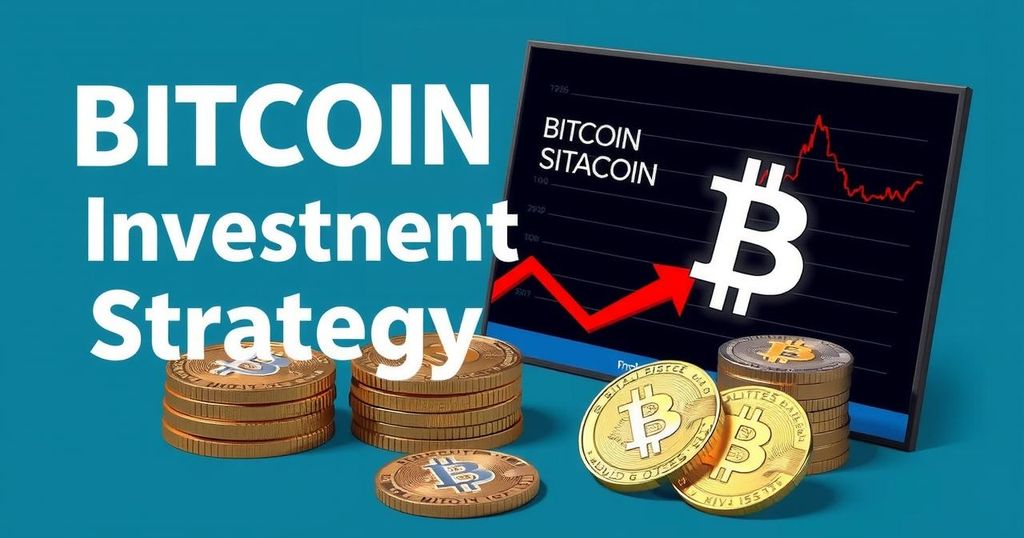Bitcoin’s Outlook for 2025: Key Economic Influences and Trends
Bitcoin is currently valued over $97,000, with four economic trends potentially influencing its trajectory in 2025. Key factors include U.S. Federal Reserve interest rate decisions, the impact of trade tariffs, geopolitical tensions, and the prospect of a U.S. strategic Bitcoin reserve. Each of these dynamics could shape investor sentiment and Bitcoin’s role within the broader financial landscape.
Presently, Bitcoin’s value has stabilized above the $97,000 level, with the conclusion of the year imminent. This article examines four crucial economic developments anticipated for 2025 that could significantly influence Bitcoin’s future trajectory. As we approach the upcoming year, Bitcoin enthusiasts are both optimistic and cautious. While the demand for exchange-traded products (ETPs) and the accumulation of Bitcoin by firms like Microstrategy are notable trends, external economic factors play a vital role in determining Bitcoin’s success.
A focal point in the economic landscape is the actions of the U.S. Federal Reserve regarding interest rates. Economists predict no major stimulus measures in the near future, yet discussions surrounding potential rate cuts are still on the table. Recently, Federal Reserve Chair Jerome Powell indicated that any reductions in rates might be limited. His statements have already had a noticeable impact on Bitcoin’s price dynamics, with market sentiment fluctuating accordingly. Currently, projections suggest a consistent federal funds rate at the next Federal Open Market Committee (FOMC) meeting.
Trade policies under the Biden administration have remained subtle, but the anticipated return of tariffs under a Trump presidency could create substantial ramifications for global inflation. The forecasted decrease in inflation from 5.9% in 2024 to 4.5% in 2025 raises both challenges and opportunities for Bitcoin. Economic uncertainty has historically driven investors toward alternative assets such as Bitcoin, prompting a need for vigilance regarding how these trade regulations will evolve.
Geopolitical risks stemming from conflicts in regions like Ukraine and the Middle East, alongside increasing global debt levels, further complicate the economic environment. These tensions typically disrupt supply chains and elevate oil prices, which can either attract investment into Bitcoin or result in market sell-offs. The intricate interplay of these factors underscores the unpredictable nature of the cryptocurrency market amidst geopolitical turmoil.
A potentially game-changing development for Bitcoin would be the establishment of a strategic Bitcoin reserve by the U.S. government, should bipartisan support be secured. Such a move could greatly enhance confidence among investors and provide an impetus for other nations to follow suit, thereby elevating global demand for Bitcoin. Additionally, the fate of 198,109 seized Bitcoins from criminal investigations raises questions regarding their future within the market.
In conclusion, as 2024 comes to a close, Bitcoin’s future will undoubtedly be shaped by an intricate blend of economic conditions, political shifts, and global uncertainties. The dual nature of Bitcoin as both a decentralized currency and a shelter against financial turmoil will likely resonate profoundly in the enhanced economic landscape of 2025. Observers will be keen to see how these factors interlink and impact Bitcoin’s value and narrative within global financial systems.
The current environment surrounding Bitcoin is characterized by elevated pricing levels and a series of anticipated economic events that may affect its valuation in 2025. Analysts and enthusiasts alike are keenly observing how these variables interplay, specifically focusing on U.S. Federal Reserve policies, trade dynamics, geopolitical conflicts, and potential strategic reserves instituted by the government. These elements collectively frame Bitcoin’s role in a continually evolving economic landscape and shape investor behavior going forward.
In essence, the trajectory of Bitcoin leading into 2025 will be significantly influenced by U.S. monetary policies, potential trade alterations, geopolitical tensions, and possible government initiatives like a strategic Bitcoin reserve. As historical trends suggest, the cryptocurrency could serve both as an investment vehicle and a hedge against economic turmoil, with its performance closely reflecting the broader financial environment. The coming year may present new challenges and opportunities for Bitcoin, marking a pivotal chapter in its ongoing evolution.
Original Source: news.bitcoin.com







Post Comment